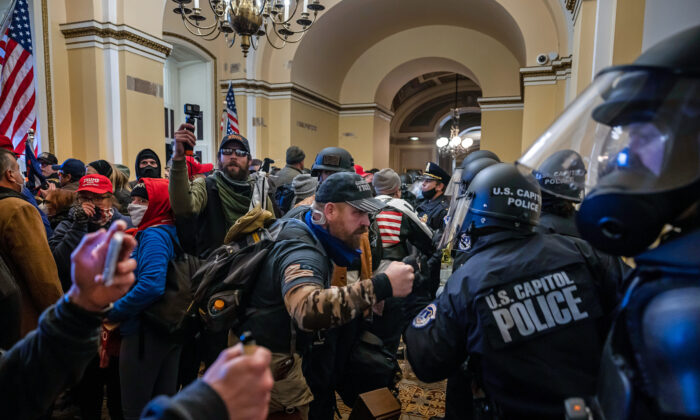A Jan. 6 defendant said he spent four months in solitary confinement in federal prison, harsh conditions that could have been avoided in light of the Supreme Court’s ruling that the Justice Department overreached when it charged hundreds of the U.S. Capitol defendants with felony obstruction.
John Strand, who was released early from prison last week, said federal prison officials in Miami locked him in solitary confinement for four months of his term over accusations ranging from publicly revealing online how far he had to walk to reach a computer to helping other Jan. 6 defendants in prison receive support from outside groups.
“It’s kind of like your entire existence is within a giant concrete shoe box,” Mr. Strand, 39, said of the cell where he served his sentence at the Miami Federal Correctional Institution. “It’s covered on all sides. There’s supposed to be a window; there’s usually some sliver of excuse for a window, but it’s not much of a window to the outside, so it’s almost windowless.”
But the obstruction charge was erased after the Supreme Court ruled last month in the case of another Jan. 6 defendant that the government was misapplying the obstruction statute. Federal prosecutors had filed the charge against multiple other defendants in the attack at the Capitol, including Mr. Strand.
The justices ruled that the obstruction charge is intended for cases of tampering with evidence.
After serving one year, Mr. Strand walked out of a Louisiana prison last Wednesday and was a free man. He said he is “grateful” for the ruling and had been praying that it would come to pass, though he and his lawyer had expected the high court would rule in favor of the Jan. 6 defendants.
Following the high court’s decision, Mr. Strand said, U.S. District Judge Christopher Reid Cooper, an Obama appointee, claimed he would have sentenced him to one year in prison anyway, even without the felony conviction.
“[Judge Cooper] said, if the felony had not been there, but I’d gone to trial, he would have sentenced me to 12 months on a first-time nonviolent misdemeanor,” he said in a phone interview. “That’s not just crazy. That’s like ten times crazy.”
The misdemeanor charges were entering and remaining in a restricted building or grounds, disorderly and disruptive conduct in a restricted building or grounds, disorderly conduct in a Capitol building, and parading, demonstrating, or picketing in a Capitol building.
During a portion of his prison sentence at the Miami facility, Mr. Strand was placed in solitary in the isolation unit.
“It’s like a giant steel, rusted red, brownish color. Everything else in the cell is concrete, so it’s all grayish, ugly, and depressing…and you’re reduced to a pulse and almost nothing else,” he said.
Prison policy dictates that those locked up in solitary confinement must be granted one hour of “recreation time” or outdoor time per day, but Mr. Strand says they violated their own policy at the Miami facility.
“They don’t even honor that. You only get that about 50% of the time, so probably roughly three hours per week that I got access ’rec’ was a dog cage,” he said. “It’s still inside the concrete hut. They just took the ceiling off that portion, so you’re still inside four concrete walls, concrete floor and dog cage mesh and razor wire everywhere.”
Mr. Strand also said that prison officials did not allow him to shower often while he was in isolation.
“I went through isolation for four straight months where I couldn’t shower for up to 72 hours at a time,” he said. “I could barely sleep. My skin was crawling.”
At the same time, he could hear the screams of other inmates serving their time in solitary confinement. Many of them were long-term inmates.
“There are 25 or 30 of these people in various cells in that isolation unit, and they are raising hell like you can’t believe, and they basically never stop,” he said. “I hyperventilated at one point in January because I was just losing my mind at the ruckus. They are going back and forth to each other, sometimes just screaming, bloody murder.”
The Washington Times reached out for comment to the Bureau of Prisons and the Miami Federal Corrections Institute.
By last November, Mr. Strand’s circumstances reached Capitol Hill during a House hearing when Rep. Matt Gaetz, Florida Republican, confronted Director of the Federal Bureau of Prisons Colette S. Peters about the treatment of Jan. 6 inmates by prison officials.
Ms. Peter said, “If anyone engages in retaliation, [the Bureau] will hold them accountable.”
Mr. Gaetz demanded that he see Mr. Strand himself during a prison visit, and Ms. Peters agreed, but that visit never happened. After the highly publicized hearing, Mr. Strand was transferred from the Miami corrections facility to a federal prison in Oakdale, Louisiana, where he spent the final months of his sentence.
Note:
Our very own Investigative Journalist, Steve Baker, stands trial next Tuesday, November 12, 2024, in the courtroom overseen by the same January 6 judge listed above: U.S. District Judge Christopher Reid Cooper, an Obama appointee. Cooper is known as a “no-nonsense judge whose history with J6 cases does NOT show leniency for those who stand charged for J6 offenses in his courtroom.”

